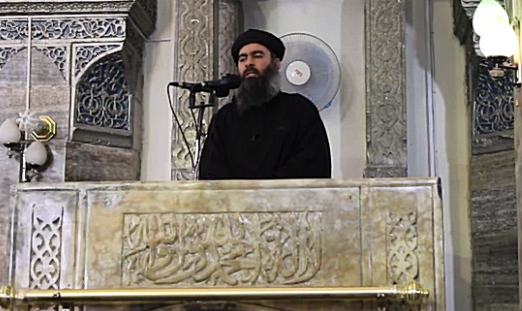By Printus LeBlanc
Reports are once again circulating about the possible death of Abu Bakr al-Baghdadi, the leader of Islamic State. It appears Syrian state-run TV is reporting the terrorist leader was killed in an airstrike but the reports remain unconfirmed. Who is this mystery figure, and what does he run?
After President Obama pulled the last U.S. troops out of Iraq on December 18, 2011, it left Iraqi President Nouri al-Maliki, a Shia Muslim, without a check against his aggression towards Sunni Muslims. President Maliki started to crackdown on Sunnis, kicking them out of security positions, and attempting to arrest prominent Sunni politicians. As you can imagine, the Sunnis were not happy. This led to massive protests in the Sunni dominated areas. Maliki then turned security forces and Shiite militias loose on the protesters. Hundreds were killed throughout the country. Whatever delicate peace and security that existed in Iraq after the U.S. troop surge in 2007 was wrecked.
While the media was ignoring the implosion of Iraq, several other Arab and North Africa nations were going through the Arab Spring. The Arab Spring was a wave of non-violent and violent protests that took many nations by surprise. It started in Tunisia, a young shop keeper, Tarek el-Tayeb Mohamed Bouazizi, was routinely harassed and humiliated by the local officials, including physical abuse. The young man finally had enough and set himself on fire. The act led to the Tunisian Revolution. The street demonstrations ground the nation to a halt and forced the longtime President, Zine El Abidine Ben Ali, to resign.
The success of the Tunisian Revolution, led to revolts, protests, and rebellions springing up in the rest of the Middle East and North Africa (MENA) region. It would lead to the ouster of Egypt’s Hosni Mubarak and the death of Libya’s strong man Muammar Gaddafi. Syrian dictator Bashar al-Assad did not go down so easily, however.
Once the protests started in the streets of Syria, Assad released hundreds of terrorists from prison to join the protesters. In Assad’s mind, this gave him legitimacy to attack the protesters as if they were terrorists. The only problem for Assad, was he was less popular than he thought. Thousands in the military left Assad to join the rebels.
The dangerous combination of angry disenfranchised Sunnis in western and northern Iraq, plus an Assad regime fighting an insurgency, and the lack of U.S. troops in Iraq, led to the formation of Islamic State with al-Baghdadi as their leader.
Al-Baghdadi was a mosque cleric prior to the U.S. invasion of Iraq in 2003. After the invasion, he helped found the militant group Jamaat Jaysh Ahl al-Sunnah wa-I-Jamahh. Baghdadi was detained and imprisoned in February 2004 at Camp Bucca, only to be released in December of 2004. Apparently, he was deemed a “low level prisoner”. Many news and media outlets have stated Baghdadi was imprisoned again from 2005-2009, but this has not been verified by the Department of Defense.
Al-Baghdadi made his presence known to the world with a speech in Mosul’s Great Mosque on Friday, July 4, 2014. The mosque is named after Nur al-Din Mahmoud Zangi. In jihadist circles, the story of Nur al-Din is well known. Al-Din lived from 1118 A.D. to 1174 A.D. in what is known today as northern Iraq and northern Syria. Al-Din was the ruler of Mosul and Aleppo and often-waged jihad against the crusaders in the region. It was his goal to unite the Muslims between the Euphrates and Nile rivers, forming a common front against the crusaders. Al-Din laid the ground work for Saladin and the formation of the Ayyubid dynasty. Saladin is also revered in the Islamic community for fighting the crusaders, and taking Jerusalem at one point.
With history as his backdrop, al-Baghdadi chose to announce the reformation of the caliphate, which he called “Caliph Ibrahim”. It was bloody getting there, and it has been extremely barbaric and bloody since then. Islamic State has burnt prisoners alive, crucified people in public squares, and taken women as sex slaves.
As we have seen with the attacks in Manchester, Paris, and Belgium, Islamic State can easily reach Europe. Now Islamic State affiliated groups are making gains on the other side of the globe, in the Philippines. Militants swept through Marawi city, killing dozens and beheading the police chief.
If al-Baghdadi is dead, that is a good thing, the world could use a win right about now. However, the work would not be done — radical Islam is bigger than any one man. The ideology must be attacked and defeated from within by Muslim reformers who reject the violence.
Perhaps the first step has been taken. Shortly after the attacks in London, 500 imams not only condemned the attacks, but refused to perform funeral prayers for the attackers. It wasn’t reported widely by the media, but this is how the tide will truly get turned. Yes, the terrorists like al-Baghdadi must be stopped, but Muslim leaders must be the ones who reject their attempts to legitimize their acts as being holy.
Printus LeBlanc is a contributing reporter at Americans for Limited Government.







